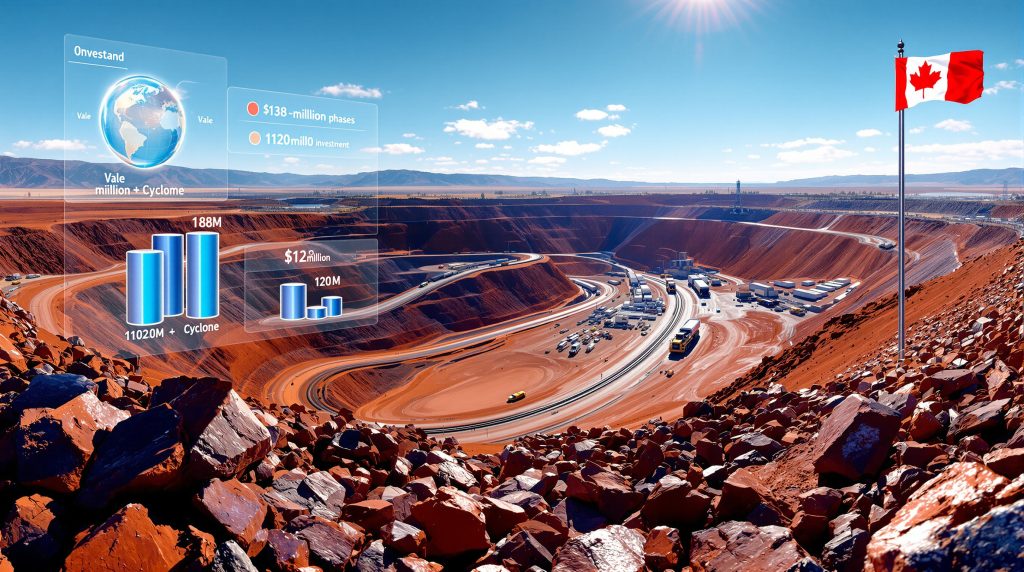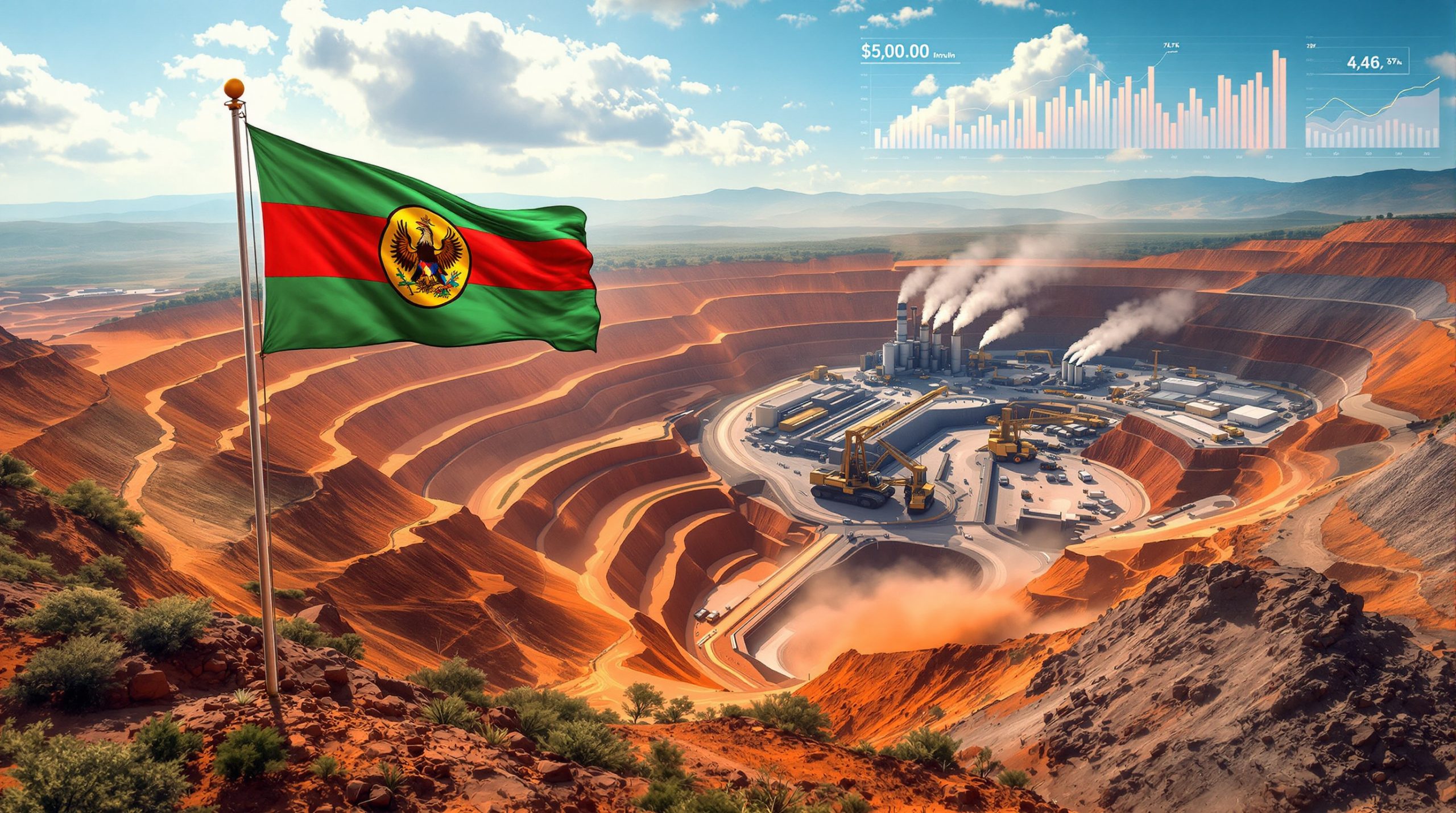The Vale and Cyclone Metals joint venture iron bear development represents a significant milestone in Canada's mining landscape, combining global expertise with local knowledge to unlock one of the region's most promising iron ore deposits. This strategic alliance focuses on developing the Iron Bear project, situated in Quebec's mineral-rich Labrador Trough region near Schefferville. Furthermore, the collaboration demonstrates how iron ore price trends continue to influence major investment decisions in the sector.
The collaboration follows a carefully structured approach that balances risk management with substantial investment potential. Vale's commitment involves a phased investment framework totaling up to $138 million, designed to systematically advance the project through critical development stages while maintaining operational flexibility.
Financial Framework and Investment Structure
Vale's investment strategy incorporates two distinct phases, each targeting specific development objectives and milestones. The initial Phase 1 contribution of $18 million funds essential preliminary activities including feasibility assessments and resource enhancement programs. Upon successful completion of Phase 1 objectives, Phase 2 could see Vale investing an additional $120 million to secure majority ownership and advance toward production decisions.
According to recent developments, Vale has made its third payment of A$5.17 million to Cyclone Metals, demonstrating continued confidence in the project's trajectory and the partnership's operational progress. This payment forms part of Vale's Phase 1 commitment and underscores the major miner's ongoing dedication to advancing the Vale and Cyclone Metals joint venture iron bear development.
Key Investment Milestones:
• Phase 1: $18 million allocated for feasibility studies and resource enhancement activities
• Phase 2: Up to $120 million designated for bankable feasibility and environmental assessments
• Total potential commitment: $138 million spanning both development phases
• Recent funding: A$5.17 million third tranche payment completed
Progressive Ownership Model Rewards Sustained Investment
The joint venture employs a progressive ownership structure that directly correlates Vale's financial commitment with corresponding equity participation. This framework incentivizes continued investment whilst providing clear pathways to majority control based on project advancement and development decisions. Additionally, the structure reflects broader North American mining trends toward strategic partnerships.
Phase 1 Development Rights and Responsibilities
During the initial development phase, Vale maintains operational development rights whilst funding critical project activities. These responsibilities encompass prefeasibility study completion, expanded drilling programmes targeting resource enhancement, comprehensive environmental baseline assessments, and structured First Nations community engagement initiatives.
The company's subsidiary, Iron Block 103 Corporation, currently holds approximately A$12.6 million earmarked specifically for Iron Bear development activities, providing dedicated funding separate from general corporate resources.
Phase 2 Equity Acquisition Framework
Upon successful Phase 1 completion, Vale can trigger Phase 2 to earn a 30% interest in the project by funding additional development activities. These activities include comprehensive bankable feasibility studies, detailed environmental impact assessments, and formal Impact Benefit Agreements with Indigenous communities.
Pathway to Majority Control
Vale's ownership stake can increase to 75% through continued investment or by electing to progress toward a formal mining decision. At this advanced stage, Vale faces two strategic options: acquire Cyclone's remaining 25% interest at fair market value, or elect to carry Cyclone through to production without dilution of the junior partner's stake.
This structure provides flexibility for both parties whilst ensuring adequate funding for development activities throughout the project lifecycle. Moreover, such structures are becoming increasingly common in mining joint ventures across the industry.
Strategic Value Proposition Drives Partnership Interest
The Iron Bear project's strategic appeal stems from multiple convergent factors including exceptional resource scale, favourable geographic positioning, and strong alignment with evolving industry trends toward sustainable mineral production. In addition, the project's development aligns with current iron ore demand insights suggesting sustained market opportunities.
Resource Scale and Geological Characteristics
Industry analysis suggests the deposit contains substantial iron ore resources positioned to support long-term production scenarios. The project's geological characteristics indicate potential for producing direct reduction concentrate, a specialised product increasingly demanded by steel producers implementing lower-carbon production technologies.
Pilot production activities have confirmed the deposit's capability to generate direct reduction concentrate, positioning the project favourably for steel industry customers transitioning toward more environmentally sustainable production methods.
Infrastructure and Logistical Advantages
The project benefits significantly from proximity to established transportation networks, including heavy-haul railway access enabling efficient bulk transport operations. This infrastructure connectivity extends to the Pointe Noire export port, providing direct access to international markets whilst reducing overall development costs through utilisation of existing transportation assets.
Key Infrastructure Benefits:
• Heavy-haul railway connectivity for cost-effective bulk transport
• Established export port access through Pointe Noire facilities
• Reduced capital requirements through existing infrastructure utilisation
• Strategic location near Schefferville supporting operational logistics
Market Positioning for Sustainable Steel Production
Iron Bear's alignment with steel industry demands for sustainable raw materials positions the partnership to potentially capture premium pricing for low-carbon iron ore products. This market positioning reflects broader industry trends toward environmental compliance and sustainable production practices throughout the steel manufacturing supply chain.
Strengthened Financial Position Supports Development Timeline
Cyclone Metals has systematically enhanced its financial foundation to support the Iron Bear development whilst protecting existing shareholders from potential dilution during the advancement process. However, implementing effective investment strategies remains crucial for sustained development progress.
Enhanced Cash Reserves and Strategic Liquidity
The company's current financial position reflects careful capital management and strategic asset monetisation. Total cash reserves now stand at A$28.2 million, with A$12.6 million held by Iron Block 103 Corporation specifically for Iron Bear development activities and A$15.6 million in unallocated reserves available for general corporate purposes.
Current Financial Standing:
| Category | Amount (A$ Million) | Purpose |
|---|---|---|
| Total Cash Reserves | 28.2 | Combined company resources |
| Iron Bear Dedicated Funds | 12.6 | Project-specific development |
| Unallocated Reserves | 15.6 | General corporate flexibility |
| Recent Vale Payment | 5.17 | Third tranche funding received |
Strategic Asset Divestiture Creates Additional Liquidity
The company's sale of its European Lithium shareholding generated A$14.3 million in additional liquidity, demonstrating management's strategic focus on core iron ore development priorities. This divestiture reflects deliberate portfolio concentration on the Iron Bear opportunity whilst monetising non-core assets at favourable valuations.
Shareholder Protection Through Capital Management
According to CEO Paul Berend, the enhanced cash position provides protection for current shareholders from near-term dilution pressures. This financial stability enables the company to maintain development momentum without requiring immediate additional equity raises that could dilute existing shareholder interests.
"The operational progress achieved over recent quarters, combined with Vale's continued funding tranches, illustrates sustained confidence in the project's development trajectory and commercial potential," the executive emphasised.
Development Milestones Create Systematic Project Advancement
The Vale and Cyclone Metals joint venture iron bear development follows a structured timeline designed to systematically reduce investment risk whilst maintaining advancement momentum toward eventual production decisions. Furthermore, the approach demonstrates sophisticated project management practices increasingly adopted across the mining sector.
Phase 1 Critical Objectives
Current development activities focus on completing essential preliminary work required for project advancement. These activities encompass prefeasibility study completion, resource enhancement through expanded drilling programmes, comprehensive environmental baseline studies, and ongoing First Nations engagement initiatives.
Current Phase 1 Activities:
• Prefeasibility study advancement and completion
• Expanded drilling programmes targeting resource confidence enhancement
• Comprehensive environmental baseline assessments
• Structured First Nations community engagement processes
• Infrastructure assessment and optimisation studies
Phase 2 Deliverable Requirements
Upon Phase 1 completion, Phase 2 activities will focus on advanced project definition and regulatory preparation. Key deliverables include bankable feasibility study completion, comprehensive environmental impact assessment finalisation, formal Impact Benefit Agreement negotiations with Indigenous communities, and submission of mining permit applications through appropriate regulatory channels.
Production Timeline Expectations
Industry observers suggest the partnership targets achieving a mining decision within a three to five-year timeframe, positioning Iron Bear as a potentially significant contributor to North American iron ore supply. This timeline reflects typical development periods for large-scale mining projects whilst accounting for regulatory approval processes and community consultation requirements.
Vale's Strategic Integration Supports Global Positioning
The Iron Bear investment aligns with Vale's broader strategic objectives around high-quality, low-carbon iron ore asset development that serves evolving steel industry requirements and environmental regulations. Consequently, the partnership demonstrates how major miners are adapting their portfolios to meet future market demands.
Decarbonisation Leadership and Market Positioning
The partnership supports industry-wide trends toward supplying materials for low-carbon steel production, addressing increasing environmental regulations and evolving customer sustainability requirements. This positioning enables potential premium pricing for specialised iron ore products meeting stringent environmental specifications.
Geographic Diversification Benefits
Iron Bear enhances Vale's North American operational presence, complementing existing mining operations whilst reducing overall geographic concentration risk across the company's global portfolio. This diversification strategy provides operational flexibility and market access advantages through multiple regional production centres.
Technology Integration Opportunities
The greenfield nature of the Iron Bear project provides opportunities for implementing Vale's latest mining technologies and sustainable development practices from project inception. This technological integration potential enables operational efficiency optimisation whilst incorporating advanced environmental management systems throughout the development process.
What are the Broader Industry Implications?
The Vale and Cyclone Metals joint venture iron bear development reflects several significant trends influencing the global iron ore industry and strategic approaches to resource development. Additionally, these trends are reshaping how mining companies approach investment decisions and partnership structures.
Sustainable Mining Focus Drives Investment Decisions
Major mining companies increasingly prioritise projects capable of producing low-carbon materials, positioning themselves for future regulatory requirements and potential market premiums. This trend reflects broader industry recognition of environmental considerations as fundamental business drivers rather than secondary compliance issues.
Joint Venture Models Enable Risk Sharing
Strategic partnerships allow established miners to access promising deposits whilst sharing development risks with local partners possessing regional expertise and community relationships. This collaborative approach enables resource optimisation whilst distributing financial and operational risks across multiple stakeholders.
Infrastructure Leverage Creates Competitive Advantages
Projects with existing transportation access gain significant competitive advantages through reduced capital requirements and accelerated development timelines. This infrastructure leverage becomes increasingly important as development costs continue rising across the mining sector.
What Development Challenges Require Careful Risk Management?
Despite favourable project fundamentals, the Iron Bear development faces typical mining project risks requiring systematic management and mitigation strategies. However, experienced management teams can effectively navigate these challenges through proper planning and stakeholder engagement.
Regulatory and Environmental Considerations
Large-scale mining developments in northern Canadian regions face complex environmental assessment requirements and extensive Indigenous consultation obligations. These regulatory processes require careful timeline management and comprehensive stakeholder engagement throughout the development process.
Key Regulatory Factors:
• Environmental assessment complexities in sensitive northern ecosystems
• Indigenous consultation requirements and formal agreement negotiations
• Evolving regulatory frameworks for large-scale mining operations
• Permitting timeline uncertainties affecting project schedules
Market and Economic Risk Factors
Iron ore price volatility continues affecting project economics and long-term viability assessments. Global steel demand fluctuations impact market projections whilst currency exchange rate variations create additional financial risk factors for international partnerships.
Technical and Operational Challenges
Resource conversion from inferred to measured categories requires extensive additional drilling and geological analysis. Infrastructure development costs and timeline uncertainties, combined with weather and logistics constraints typical of northern Canadian operations, create operational complexity requiring experienced management teams.
Competitive Positioning Within Global Iron Ore Development
Iron Bear's scale and strategic characteristics position it among significant global iron ore development projects, though with distinct advantages and challenges compared to alternative opportunities. Furthermore, the project's unique attributes provide competitive differentiation in an increasingly crowded development pipeline.
Resource Scale and Quality Differentiation
The project's substantial resource base ranks among larger undeveloped iron ore deposits globally, though smaller than established mega-operations. The deposit's capability to produce direct reduction concentrates provides quality differentiation advantages for steel mills implementing lower-carbon production technologies.
Development Stage Advantages
As a greenfield development opportunity, Iron Bear offers implementation of latest-generation mining technologies and environmental management practices from project inception. This development stage flexibility contrasts with expansion projects at existing operations where legacy infrastructure may constrain optimisation opportunities.
Infrastructure and Location Benefits
The project's proximity to established transportation networks provides significant development advantages compared to remote deposits requiring extensive new infrastructure construction. This infrastructure access translates to reduced capital requirements and accelerated development timelines relative to alternative opportunities.
Investment Considerations for Mining Sector Stakeholders
The partnership presents multiple factors relevant to mining sector investors and industry stakeholders evaluating development opportunities. However, thorough due diligence remains essential given the complexities inherent in large-scale mining developments.
Risk-Reward Assessment Framework
The partnership offers exposure to large-scale, high-quality iron ore resources with established infrastructure advantages, balanced against development timeline uncertainties and regulatory approval requirements typical of major mining projects. This risk-reward profile appeals to investors seeking diversified exposure to North American iron ore market growth.
Timeline Expectations and Development Phases
Stakeholders should anticipate a multi-year development process spanning feasibility studies, environmental assessments, and regulatory approvals before production commencement. This timeline reflects industry-standard development periods for large-scale mining operations whilst accounting for comprehensive stakeholder consultation processes.
Market Context and Demand Dynamics
The partnership occurs amid growing demand for sustainable steel production inputs, potentially supporting favourable long-term pricing dynamics for specialised iron ore products. This market context reflects broader industrial trends toward environmental compliance and sustainable supply chain management across steel manufacturing sectors.
According to industry analysis, the project's development timeline aligns with anticipated market conditions favouring high-quality iron ore products. Consequently, the partnership positions both companies to capitalise on evolving market dynamics.
Investment Considerations Summary:
• Large-scale resource exposure with infrastructure advantages
• Multi-year development timeline requiring patient capital
• Potential premium pricing for low-carbon iron ore products
• Geographic diversification benefits within North American mining sector
• Regulatory and environmental risk factors requiring active management
Disclaimer: This article contains forward-looking statements and projections based on current industry analysis and company disclosures. Mining development projects involve significant risks including regulatory delays, commodity price volatility, and technical challenges that may impact project timelines and commercial viability. Readers should conduct independent research and consult qualified professionals before making investment decisions.
Want to Discover the Next Major Mineral Investment Opportunity?
Discovery Alert's proprietary Discovery IQ model delivers real-time alerts on significant ASX mineral discoveries, instantly empowering subscribers to identify actionable opportunities ahead of the broader market. Understand why historic discoveries can generate substantial returns by visiting Discovery Alert's dedicated discoveries page, showcasing exceptional outcomes from major mineral finds.




